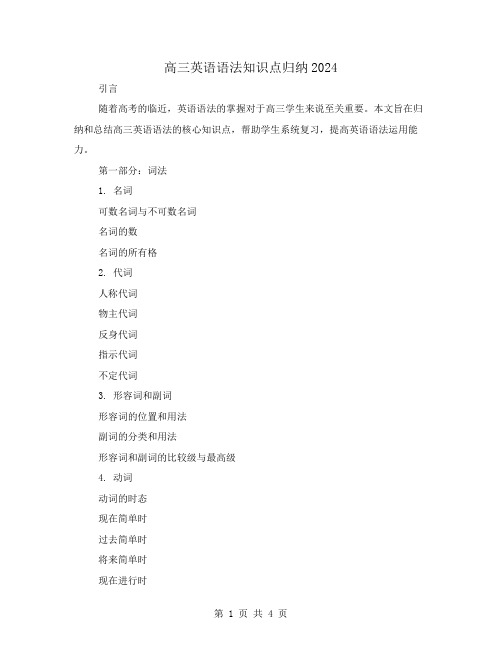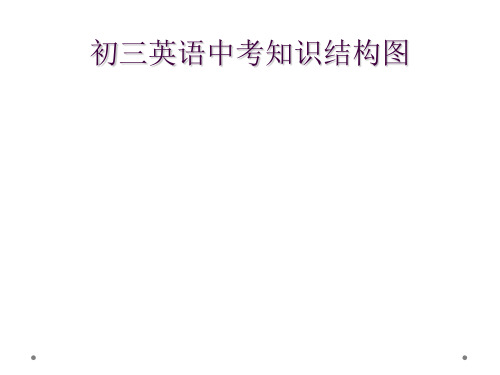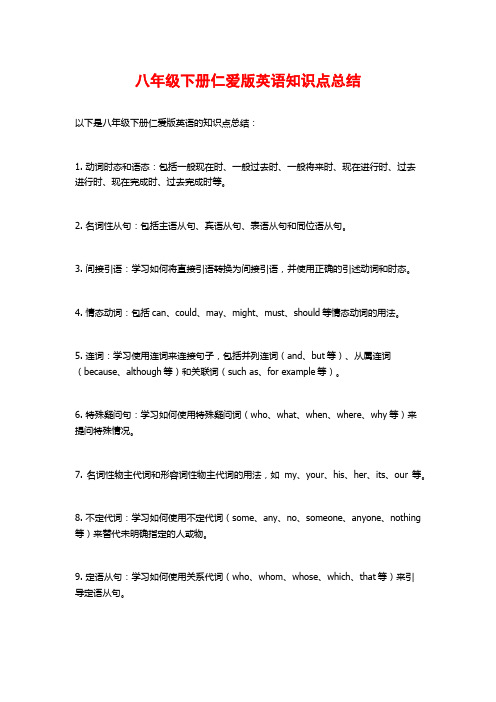初三英语总复习专项练习五直接引语间接引语不定代词
常用英语语法术语表Grammatical-Terms

常用英语语法术语表Grammatical-Terms常用英语语法术语表Grammatical Terms 1. 语法grammar句法syntax词法morphology结构structure句子sentence从句clause词组phrase词类part of speech实词notional word虚词structural word单纯词simple word派生词derivative复合词compound词性part of speech名词noun专有名词proper noun普通名词common noun可数名词countable noun不可数名词uncountable noun抽象名词abstract noun具体名词concret noun物质名词material noun集体名词collective noun个体名词individual noun介词preposition连词conjunction动词verb主动词main verb及物动词transitive verb不及物动词intransitive verb 系动词link verb助动词auxiliary verb情态动词modal verb规则动词regular verb不规则动词irregular verb 短语动词phrasal verb限定动词finite verb非限定动词infinite verb使役动词causative verb感官动词verb of senses动态动词event verb静态动词state verb感叹词exclamation形容词adjective副词adverb方式副词adverb of manner程度副词adverb of degree时间副词adverb of time地点副词adverb of place修饰性副词adjunct连接性副词conjunct疑问副词interogative adverb关系副词relative adverb代词pronoun人称代词personal pronoun物主代词possesive pronoun反身代词reflexive pronoun相互代词reciprocal pronoun指示代词demonstrative pronoun疑问代词interrogative pronoun关系代词relative pronoun不定代词indefinite pronoun物主代词possecive pronoun名词性物主代词nominal possesive prnoun形容词性物主代词adjectival possesive pronoun冠词article定冠词definite article不定冠词indefinite article数词numeral基数词cardinal numeral序数词ordinal numeral分数词fractional numeral形式form单数形式singular form复数形式plural form限定动词finite verb form非限定动词non-finite verb form 原形base form2.morphology词法notional实词form word虚词word-building构词法root词根prefix前缀suffix后缀synonym同义词antonym反义词conversion转化法derivation派生法affixation词缀法composition合成法compound复合词parts of speech词类noun名词pronoun代词numeral数词adjective形容词verb动词adverb副词article冠词preposition介词conjunction连词interjection感叹词particle引导词classification of nouns名词的分类common noun普通名词proper noun专有名词collective noun集合名词material noun物质名词abstract noun抽象名词countable noun可数名词personal pronoun人称代词possessive pronoun物主代词reflexive pronoun反身代词demonstrative pronoun指示代词interrogative pronoun疑问代词relative pronoun关系代词indefinite pronoun不定代词reciprocal pronoun相互代词case格nominative case主格objective case宾格possessive case所有格singular form单数形式plural form复数形式cardinal numeral基数词ordinal numeral序数词fraction numeral分数数词degrees of comparison比较级positive degree原级comparative degree比较级superlative degree最高级notional verb实义动词modal verb情态动词link verb连系动词auxiliary verb助动词transitive verb及物动词intransitive verb不及物动词regular verb规则动词irregular verb不规则动词finite verb限定动词non-finite verb非限定动词person人称number数gender性tense时态voice语态mood语气principal forms of verbs动词的主要形式present form现在形式past form过去形式participle分词present participle现在分词past participle过去分词infinitive不定式gerund动名词verbal noun动名词simple present tense一般现在时simple past tense一般过去时simple future tense一般将来时present continuous tense现在进行时past continuous tense过去进行时future continuous tense将来进行时past perfect tense过去完成时future perfect tense将来完成时present perfect continuous tense现在完成进行时future perfect continuous tense将来完成进行时sequence of tenses时态的呼应passive voice被动语态active voice主动语态indicative mood陈述语气imperative mood祈使语气subjunctive mood虚拟语气adverb of time 时间副词adverb of place地点副词adverb of manner方式副词adverb of degree程度副词adverb of frequency频度副词conjunctive adverb连接副词definite article定冠词indefinite article不定冠词coordinating conjunction并列连词subordinating conjunction从属连词syntax句法declarative sentence陈述句imperative sentence祈使句exclamatory sentence感叹句interrogative sentence疑问句general question一般疑问句special question特殊疑问句alternative question选择疑问句disjunctive question反意疑问句simple sentence简单句compound sentence并列句语法术语Grammar Terms 语法grammar句法syntax词法morphology结构structure句子sentence从句clause词组phrase词类part of speech实词notional word虚词structural word名词noun专有名词proper noun普通名词common noun可数名词countable noun不可数名词uncountable noun 抽象名词abstract noun具体名词concrete noun物质名词material noun集体名词collective noun个体名词individual noun介词preposition连词conjunction动词verb主动词main verb及物动词transitive verb不及物动词intransitive verb 系动词link verb助动词auxiliary verb情态动词modal verb规则动词regular verb不规则动词irregular verb短语动词phrasal verb限定动词finite verb非限定动词infinite verb使役动词causative verb感官动词verb of senses动态动词event verb静态动词state verb感叹词exclamation形容词adjective副词adverb方式副词adverb of manner程度副词adverb of degree时间副词adverb of time地点副词adverb of place修饰性副词adjunct连接性副词conjunct疑问副词interrogative adverb 关系副词relative adverb代词pronoun人称代词personal pronoun物主代词possessive pronoun 反身代词reflexive pronoun相互代词reciprocal pronoun指示代词demonstrative pronoun疑问代词interrogative pronoun关系代词relative pronoun不定代词indefinite pronoun名词性物主代词nominal possessive pronoun形容词性物主代词adjectival possessive pronoun冠词article定冠词definite article不定冠词indefinite article数词numeral基数词cardinal numeral序数词ordinal numeral分数词fractional numeral形式form单数形式singular form复数形式plural form限定动词finite verb form非限定动词non-finite verb form原形base form从句clause从属句subordinate clause并列句coordinate clause名词从句nominal clause定语从句attributive clause状语从句adverbial clause宾语从句object clause主语从句subject clause同位语从句appositive clause时间状语从句adverbial clause of time地点状语从句adverbial clause of place方式状语从句adverbial clause of manner让步状语从句adverbial clause of concession原因状语从句adverbial clause of cause结果状语从句adverbial clause of result目的状语从句adverbial clause of purpose条件状语从句adverbial clause of condition真实条件状语从句adverbial clause of real condition非真实条件状语从句adverbial clause of unreal condition 含蓄条件句adverbial clause of implied condition错综条件句adverbial clause of mixed condition句子sentence简单句simple sentence并列句compound sentence复合句complex sentence并列复合句compound complex sentence 陈述句declarative sentence疑问句interrogative sentence一般疑问句general question特殊疑问句special question选择疑问句alternative question附加疑问句tag question反义疑问句disjunctive question修辞疑问句rhetorical question感叹疑问句exclamatory question存在句existential sentence肯定句positive sentence否定句negative sentence祈使句imperative sentence省略句elliptical sentence感叹句exclamatory sentence基本句型basic sentence pattern句子成分members of sentences主语subject谓语predicate宾语object双宾语dual object直接宾语direct object间接宾语indirect object复合宾语complex object同源宾语cognate object补语complement主补subject complement宾补object complement表语predicative定语attribute同位语appositive状语adverbial句法关系syntactic relationship 并列coordinate从属subordination修饰modification前置修饰pre-modification后置修饰post-modification限制restriction双重限制double-restriction非限制non-restriction数number单数形式singular form复数形式plural form规则形式regular form不规则形式irregular form格case普通格common case所有格possessive case主格nominative case宾格objective case性gender阳性masculine阴性feminine通性common中性neuter人称person第一人称first person第二人称second person第三人称third person时态tense过去将来时past future tense过去将来进行时past future continuous tense过去将来完成时past future perfect tense一般现在时present simple tense一般过去时past simple tense一般将来时future simple tense现在完成时past perfect tense过去完成时present perfect tense将来完成时future perfect tense现在进行时present continuous tense过去进行时past continuous tense将来进行时future continuous tense过去将来进行时past future continuous tense现在完成进行时present perfect continuous tense 过去完成进行时past perfect continuous tense语态voice主动语态active voice被动语态passive voice语气mood陈述语气indicative mood祈使语气imperative mood虚拟语气subjunctive mood否定negation否定范围scope of negation全部否定full negation局部否定partial negation转移否定shift of negation语序order自然语序natural order倒装语序inversion全部倒装full inversion部分倒装partial inversion直接引语direct speech间接引语indirect speech自由直接引语free direct speech自由间接引语free indirect speech一致agreement主谓一致subject-predicate agreement 语法一致grammatical agreement概念一致notional agreement就近原则principle of proximity强调emphasis重复repetition语音pronunciation语调tone升调rising tone降调falling tone降升调falling-rising tone文体style正式文体formal非正式文体informal口语spoken/oral English感情色彩emotional coloring 褒义commendatory贬义derogatory幽默humorous讽刺sarcastic挖苦ironic。
维克多新课标高中英语语法PDF

维克多新课标高中英语语法pdf维克多新课标高中英语语法是一套针对中国高中学生设计的英语语法学习材料,它遵循了中国教育部制定的新课标要求,旨在帮助学生掌握英语语法的基本规则和应用技巧。
以下是该材料可能包含的一些主要内容:1. 名词:名词的分类,包括专有名词、普通名词、可数名词和不可数名词,以及名词的数和所有格形式。
2. 代词:代词的用法,包括人称代词、物主代词、反身代词、指示代词和不定代词等。
3. 形容词和副词:形容词和副词的比较级和最高级形式,以及它们在句子中的位置和用法。
4. 动词:动词的时态和语态,包括一般现在时、过去时、完成时等,以及被动语态的构成和用法。
5. 非谓语动词:包括动名词、不定式和分词的用法,以及它们在句子中充当不同成分的情况。
6. 句子结构:简单句、并列句和复合句的结构分析,以及主语、谓语、宾语、定语、状语和补语的识别和应用。
7. 直接引语和间接引语:如何将直接引语转换为间接引语,以及时态和人称的变化规则。
8. 条件句:真实条件句和非真实条件句的构成,以及各种情况下的时态使用。
9. 定语从句:定语从句的引导词选择和句子结构,以及如何正确使用关系代词和关系副词。
10. 状语从句:时间、地点、原因、结果、目的、条件和让步状语从句的用法和结构。
11. 虚拟语气:虚拟语气在不同情况下的用法,包括对现在、过去和将来的虚拟。
12. 疑问句:一般疑问句、特殊疑问句和选择疑问句的构成和回答方式。
13. 强调句:强调句的构成和用法,以及如何通过强调句来突出句子中的某个部分。
14. 倒装句:完全倒装和部分倒装的用法,以及它们在强调和修辞中的作用。
15. 语法练习:每个语法点后都配有相应的练习题,帮助学生巩固和应用所学知识。
维克多新课标高中英语语法pdf文件通常会包含上述内容的详细解释和示例,以及适量的练习题,以帮助学生更好地理解和掌握英语语法。
高三英语语法知识点归纳2024

高三英语语法知识点归纳2024引言随着高考的临近,英语语法的掌握对于高三学生来说至关重要。
本文旨在归纳和总结高三英语语法的核心知识点,帮助学生系统复习,提高英语语法运用能力。
第一部分:词法1. 名词可数名词与不可数名词名词的数名词的所有格2. 代词人称代词物主代词反身代词指示代词不定代词3. 形容词和副词形容词的位置和用法副词的分类和用法形容词和副词的比较级与最高级4. 动词动词的时态现在简单时过去简单时将来简单时现在进行时过去进行时将来进行时现在完成时过去完成时将来完成时动词的语态被动语态的构成和用法动词的非谓语形式动名词不定式分词5. 介词介词的分类介词的固定搭配介词短语的用法6. 连词并列连词从属连词连词的用法和区别7. 冠词不定冠词定冠词零冠词的使用情况第二部分:句法1. 句子成分主语谓语宾语表语定语状语2. 句子种类陈述句疑问句祈使句感叹句3. 句子结构简单句并列句复合句名词性从句定语从句状语从句4. 直接引语和间接引语直接引语的用法间接引语的转换5. 虚拟语气虚拟语气的构成虚拟语气的用法第三部分:特殊句式1. 强调句强调句的构成强调句的用法2. 倒装句完全倒装部分倒装3. 省略句省略的规则省略的用法第四部分:写作中的语法应用1. 语法在写作中的重要性2. 常见错误分析3. 提高写作语法准确性的策略结语语法是英语学习的基石,掌握好语法规则对于提高英语水平至关重要。
希望本文能够帮助高三学生在语法学习上取得突破,为高考英语科目的成功打下坚实的基础。
初三英语中考知识结构图

动词不定式
句法
句子的种类
陈述句(肯定式、否定式)、疑问句(一般、特殊、选择、 反意)、祈使句、感叹句
句子的成分
主语、谓语、宾语、(直接宾语、间接宾语)表语、定语、 状语
简单句
六个基本句型
句子的类型
并列句
主从复合句 直接引语与间接引语
宾语从句、状语从句、 定语从句
词汇
全部义务教育阶段英语词汇表(约1600个)及其派生词
阅读
写作 知识运用
基本技能
运用简单的阅读策略获取信息,根据上下文和构词法推断、理解 生词含义,理解句子间的逻辑关系,找出文章的主题、理解故事 情节、预测故事的结局。
理解文中细节
掌握语篇或段落主旨大意
基本题型
概括、归纳、推断深层含义 判断词义
领会作者意图、判断人物性格
常见问题
辨认图形及数据推理
根据图示或表格写出短文,根据要求写日记、短信、便条等,简单地描述 人或事件
基本思路
确立主题、列出提纲、收集素材、打好草稿、改正错误、认真抄写
单项填空、完形填空、短文填空、补全对话
汇报结束
谢谢大家! 请各位批评指正
短语
动词短语、名词短语、介词短语
交际用语
问候、介绍、告别、祝愿、祝贺、道歉、邀请、问路、购物、就餐、看病、帮助、 请求、同意、允诺、喜好、厌恶、判断、可能、建议、劝告、文回答问题、根据录音内容填空、判断正误、根据录音内容排序、 根据录音内容匹配
口语
对话、访谈、复述、描述、讨论、角色扮演、朗读、回答问题
初三英语中考知识结构图
语法 词汇 短语
交际用语
中
考
英 语
听力
知
识
网 络
八年级下册仁爱版英语知识点总结

八年级下册仁爱版英语知识点总结
以下是八年级下册仁爱版英语的知识点总结:
1. 动词时态和语态:包括一般现在时、一般过去时、一般将来时、现在进行时、过去
进行时、现在完成时、过去完成时等。
2. 名词性从句:包括主语从句、宾语从句、表语从句和同位语从句。
3. 间接引语:学习如何将直接引语转换为间接引语,并使用正确的引述动词和时态。
4. 情态动词:包括can、could、may、might、must、should等情态动词的用法。
5. 连词:学习使用连词来连接句子,包括并列连词(and、but等)、从属连词(because、although等)和关联词(such as、for example等)。
6. 特殊疑问句:学习如何使用特殊疑问词(who、what、when、where、why等)来
提问特殊情况。
7. 名词性物主代词和形容词性物主代词的用法,如my、your、his、her、its、our等。
8. 不定代词:学习如何使用不定代词(some、any、no、someone、anyone、nothing 等)来替代未明确指定的人或物。
9. 定语从句:学习如何使用关系代词(who、whom、whose、which、that等)来引
导定语从句。
10. 过去分词和现在分词的用法:学习如何使用过去分词和现在分词作为修饰词或动词的补语。
11. 被动语态:学习如何使用被动语态来描述动作的接受者而非执行者。
12. 表达条件和假设的句型:学习如何使用if和unless来表达条件,以及表示假设的句型。
这些知识点涵盖了八年级下册仁爱版英语的基础内容,你可以根据需要逐一进行学习和复习。
小学英语语法知识点归纳

小学英语语法知识点归纳英语语法是英语学习的重要部分,对于小学生来说,掌握基本的语法知识是打好英语基础的关键。
本文将对小学英语常用的语法知识点进行归纳,帮助小学生更好地理解和运用英语语法。
1. 词性英语单词可以分为不同的词性,如名词(noun)、动词(verb)、形容词(adjective)、副词(adverb)、介词(preposition)等。
了解每种词性的特点和用法是理解句子结构的基础。
2. 动词时态动词时态表示动作或状态发生的时间。
常见的动词时态有一般现在时(simple present)、一般过去时(simple past)、一般将来时(simple future)等。
小学生需要学会根据句子的时间要求来使用不同的动词时态。
3. 代词代词(pronoun)是用来代替名词的词语。
常见的代词有人称代词(personal pronouns)、指示代词(demonstrative pronouns)、不定代词(indefinite pronouns)等。
学生需要学会正确使用代词来避免重复使用名词。
4. 句子的主谓一致句子的主谓一致是指句子中的主语和谓语动词在人称和数上保持一致。
学生需要注意主语是单数还是复数,并且选择相应的谓语动词形式。
5. 名词的单复数英语名词有单数和复数形式,在使用名词时需要注意单复数的规则。
有些名词加上-s或-es变成复数形式,而有些名词则需要变化拼写。
6. 形容词和副词的比较级和最高级形容词和副词有原级、比较级和最高级三种形式,用于表示程度的比较。
学生需要学会根据不同的含义和规则来构造形容词和副词的比较级和最高级。
7. 介词短语介词(preposition)短语是由介词和它的宾语组成的短语。
介词短语通常用来修饰其他词或短语,并在句子中起到表示时间、地点、方向等方面的作用。
8. 疑问句疑问句是用来询问信息或确认某事的句子。
常见的疑问句有一般疑问句(yes/no questions)和特殊疑问句(wh- questions)。
(推荐)新概念第一册101课-直接引语与间接引语1和反义疑问句概要
read sth to sb 读给某人听 read sth for sb 替某人读
P: He says he's just arrived in Scotland. He says he's staying at a Youth Hostel. You know he's a member of the Y.H.A.
card
n. 明信片
youth
n. 青年
hostel
n. 招待所,旅馆
association
n. 协会
sritten) v. 写
• 明信片的由来 :
• 1865年,德国有一位画家(名字未 考证)在一张硬纸上画了一幅画, 同时写上几句问候的话,打算寄给 他的朋友,但找不到有这多大的信 封来装寄,后来在邮局职员的建议 下,这画上图案的硬纸背后上,写 上朋友的地址和姓名寄出,这就是 明信片的鼻祖。
该国的青年人 一 般都有礼貌
The youth of the nation is polite in general. 2)青年(少年)时期,青春时期 他少年时代在美国度过
He spent his youth in the U.S.A 他年轻时学过意大利语。
He studied Italian in his youth. 3)青春
你报告写好了没有? 用英文写
write in English Write to sb. 给某人写信 我一个月给我家人写两封信。 I write to my family twice a month.
G: Read Jimmy's card to me please, penny.
P: 'I have just arrived in Scotland and I'm staying at a Youth Hostel.'
高考英语必考语法知识点归纳总结
高考英语必考语法知识点归纳总结在高考英语考试中,语法是一个非常重要且必考的内容。
掌握语法知识点不仅可以帮助我们正确理解句子的含义,还可以帮助我们准确地表达自己的意思。
下面将对高考英语必考的语法知识点进行归纳总结。
一、动词及时态1.动词的基本用法:- 动词的基本形式用于表达一般情况;- 动词的过去式用于表示过去发生的动作或状态;- 动词的现在分词形式可用作形容词或进行时态的谓语;- 动词的过去分词形式可用作被动语态的谓语。
2.动词的时态:- 一般现在时:表示经常性、习惯性的动作或状态;- 现在进行时:表示正在进行的动作;- 一般过去时:表示过去某个时间发生的动作或状态;- 过去进行时:表示过去某个时间正在进行的动作;- 将来时:表示将来发生的动作或状态。
3.动词的语态:- 主动语态:表示主语进行或完成动作;- 被动语态:表示主语接受动作。
二、代词1.人称代词:- 主格代词用作主语;- 宾格代词用作宾语或介词的宾语;- 形容词性物主代词用于修饰名词;- 名词性物主代词在句中充当名词的作用;- 反身代词表示动作的主体同时也是动作的承受者。
2.指示代词:- 指示代词可用于指示距离的远近或在句中代替特定的事物。
3.不定代词:- 不定代词用于代替不确定或泛指的人或事物。
三、形容词和副词1.形容词:- 形容词修饰名词,用于描述或限定名词。
2.副词:- 副词修饰动词、形容词或其他副词,用于描述或限定动作的方式、程度等。
四、句型和从句1.简单句:- 简单句由主语和谓语构成,能够独立表达一个完整的意思。
2.并列句:- 并列句由两个或多个独立的分句组成,各分句之间用连词连接。
3.复合句:- 复合句包括一个主句和一个或多个从句。
4.定语从句:- 定语从句用来修饰一个名词或代词,并且不能独立成句。
5.名词性从句:- 名词性从句可以在句子中充当主语、宾语或表语。
五、形式和语气1.直接引语和间接引语:- 直接引语是原话的直接陈述或引述;- 间接引语是对原话的复述或改写。
英语语法词汇
英语语法形式抽象名词abstract noun副词adverb形容词adjective冠词article助动词auxiliary verb基数词cardinal numeral集体名词collective noun普通名词common noun连接词conjunction可数名词countable noun定冠词definite sentence指示代词demonstrative pronoun 限定词determiner动名词gerund不定冠词indefinite article不定代词indefinite pronoun感叹词interjection word疑问代词interrogative pronoun 不及物动词intransitive verb不规则动词irregular verb (连)系动词link verb物质名词material noun情态动词modal noun非限定动词non-finite verb名词noun数词numberal序数词ordinal numeral人称代词personal pronoun短语动词phrasal verb复数名词plural noun物主代词possesive pronoun谓语动词predicate verb代词pronoun专有名词proper noun量词quantifier规则动词regular verb关系副词relative adverb关系代词relative pronoun自身代词self/reflexive pronoun 单数名词singular noun及物动词transitive verb不可数名词uncountable noun 动词verb非限定动词verbal 形容词短语adjective phrase同位语appositive定语attribute补语complement复合宾语complex object直接宾语direct object直接引语direct speech形式宾语formal object形式主语formal subject间接引语indirect speech间接宾语indirect object修饰词语modifier宾语object宾语补足语object complement插入语parenthetical statement过去分词短语past participle phrase谓语predicate介词短语prepositional phrase现在分词短语present participle phrase主语subject动词短语verb phrase状语从句adverbial clause肯定句affirmative sentence选择疑问句alternative question同位语从句appositive clause复合句complex sentence并列句compound sentence条件句conditional sentence陈述句declarative sentence强调句emphatic sentence感叹句exclamatory sentence一般疑问句general question祈使句imperative sentence疑问句interrogative sentence倒装句inverted sentence否定句negative sentence非限定性从句non-defining clause非限制性定语从句non-restrictive relative clause 名词从句noun clause宾语从句object clause表语从句predicative clause简单句simple sentence特殊疑问句special question主语从句subject clause。
高中英语语法归纳总结
高中英语语法归纳总结高中英语语法是学习英语不可或缺的一部分,掌握好语法知识对于提高英语水平和应对考试非常重要。
下面将对高中英语语法进行归纳总结,希望对同学们的学习有所帮助。
一、句子结构1. 主谓一致:主语和谓语在人称和数上要保持一致。
例句:He goes to school every day. (主语为第三人称单数,谓语动词用单数形式)2. 宾语:接在动词后面,表示动作的承受者或者所受动作的对象。
例句:She bought a new book yesterday. (book为宾语)3. 定语:修饰名词或代词,放在被修饰的词之前。
例句:The red car is mine. (red为定语)4. 状语:修饰动词、形容词或副词,用来表示时间、地点、方式等。
例句:He speaks English fluently. (fluently为状语)5. 主语从句:作为主语的从句。
例句:What he said is true. (宾语从句作为主语)二、时态与语态1. 一般现在时:表示经常性的动作或现在的状态。
例句:I play soccer every weekend. (表示经常性的动作)2. 一般过去时:表示过去的动作或状态。
例句:She studied English yesterday. (表示过去的动作)3. 一般将来时:表示将来的动作或状态。
例句:They will go to the park tomorrow. (表示将来的动作)4. 现在进行时:表示正在进行的动作。
例句:He is reading a book now. (表示正在进行的动作)5. 过去进行时:表示过去某个时刻正在进行的动作。
例句:They were playing basketball at 5 o'clock yesterday. (表示过去某个时刻正在进行的动作)6. 被动语态:表示动作的承受者位于谓语动词的前面。
- 1、下载文档前请自行甄别文档内容的完整性,平台不提供额外的编辑、内容补充、找答案等附加服务。
- 2、"仅部分预览"的文档,不可在线预览部分如存在完整性等问题,可反馈申请退款(可完整预览的文档不适用该条件!)。
- 3、如文档侵犯您的权益,请联系客服反馈,我们会尽快为您处理(人工客服工作时间:9:00-18:30)。
2013-2014学年度中考复习不定代词专项练习学校:___________姓名:___________班级:___________考号:___________一、单项选择1. was born being good at all things. You can do well in things through hard work. As an English learner, you can’t be excellent without enough practice.A. EverybodyB. SomebodyC. Nobody2.—What do you think of these two books?—______ of them are interesting.And I’ve read them several times.A.BothB.NeitherC.NoneD. Either3.There is _____ wrong with my computer. It doesn' t work now . I ' ll buy a new one .A.nothing.B. something.C. everything.4.—Mum, I' m hungry. Is there to eat?—Yes, you can have some bread on the table.A. somethingB. nothingC. anything5.—Does your English teacher chat with you on QQ?—Yes, sometimes. It’s _______ we enjoy doing at weekends.A. anythingB. somethingC. everythingD. nothing6.“I don’t think I am different from else. I am just the son of a farmer,” Mo Yan said.A. anyoneB. nobodyC.someone D. everyone7.There were only two paintings for sale and he bought ____.A. allB. anyC. bothD. some8.There is only one ticket for Lucy and Susan. So ______ of them will go to the movie.A. eitherB. neitherC. both9.My host family tried to cook ________ for me when I studied in New Zealand.A. different somethingB. different anythingC. something differentD. anything different10.My family has two dogs. One is white, ________ is black.A. otherB. anotherC. the otherD. others11.Our English teacher bought us many new books. ______of them is very interesting.A. AllB. BothC. EveryD. Each12.—Don't be angry with your kid when he makes a mistake again, will you?—No, I won 't. I know that of us are perfect after all.A. noneB. neitherC. eachD. all13.—Which of the two T-shirts will you take?—I’ll take . One is for my brother and the other is for myself.A. eitherB. bothC. neitherD. all14.---Morning, class. Is _________ here?---No, sir. Tom is absent.A. anybodyB. everybodyC. nobodyD. somebody15.Your tea smells great!It’s from India.Would you like ________?A.it B.this C.some D.1ittle16.__________ is waiting for you at the gate. He wants to say thanks to you.A.SomebodyB.AnybodyC.EverybodyD.Nobody17.—Which of the two subjects do you like, art or music?— . They are really interesting.A. NeitherB. BothC. NoneD. All18.---Wow! You’ve got so many clothes.---But ________ of them are in fashion now.A. allB. bothC. neitherD. none19.—All the volunteers were very tired, but of them took a rest.—They were busy looking for the missing people.A. neitherB. allC. bothD. none20.-Which do you prefer, a CD player or a walkman?-______. I prefer a portable computer.A. BothB. EitherC. NoneD. Neither21.You don’t have a drink. Can I get you _______?A. somethingB. anythingC. nothingD. everything22.Tom speaks Chinese better than _______ else in his class.A. no oneB. anotherC. anyoneD. the one23.I have to tell you.A. anything interestingB. something interestingC. interesting anythingD. interesting something24.They are able to talk openly to one another whenever _________ of them feels hurt.A. eitherB. bothC. someD. all25.There has never been such a beautiful village _________ in the world.A. anywhereB. everywhereC. somewhereD. nowhere26.—Who helped Betty tidy up the bedroom just now?—_________. She cleaned it all by herself.A. SomebodyB. NobodyC. EverybodyD. Anybody27. We arrived at the station too early and had to go, so we sat there and chatted with each other.A. somewhereB. anywhereC. everywhereD. nowhere28.He thinks himself somebody, but we think him ______.A. nobodyB. anybodyC. somebodyD. everybody29. Lily had a bad stomachache. But the doctor said there was ____________with her.A.new nothingB. serious somthingC.everything seriousD. nothing serious30.—Look! There are lots of old people in the park.—They look relaxed. Some are playing the card , ___________ are chatting.A. anotherB. the otherC. otherD. others 31.—Would you like tea or coffee?—_____________is ok. I’d like water.A.BothB. NeitherC. EitherD. All32.—Summer is coming. I want to go ___________cool.—Me, too.A. nothingB. anybodyC. somethingD. somewhere33.—I prefer speaking to listening in English learning.—Oh, really? I think you should do well in______ of them.A. bothB. neitherC. someD. all34. _ may have a chance to be successful if he tries his best.A. SomebodyB. EverybodyC. NobodyD. None35.— Has called the police?— Yes, Jim has.A. everyoneB. anyoneC. no oneD. one36.--Which basketball player do you like best, Kobe, James or Jordan?--- of them. Lin Shuhao is my favourite.A. AllB. NoneC. EitherD. Neither37.--- ________ of them knows the answer. What can we do now? --- Let’s ask a third boy for help.A. BothB. EitherC. NeitherD. None38.— Who helped you clean the bedroom yesterday, Kitty?—_______. I cleaned it all by myself.A. SomebodyB. EverybodyC. NobodyD. Anybody39.--- When shall we go to West Slender Lake, this afternoon or tomorrow morning?--- ______ is OK. I’m free these days.A. BothB. AllC. EitherD. Neither40.______ can make my mother change her mind. She is such a person who never gives up easily.A. SomethingB. AnythingC. NothingD. Everything41.Jack recommended me a few foreign movies, but _____ was to my taste.A. allB. neitherC. someD. none42.--- What can I do for you, sir?--- It’s so hot now. Could you give me _____________.A. cold something to eatB. anything cold to drinkC. anything cold to eatD. something cold to drink43.---Tom, supper is ready.----I don't want to eat____________ ,Mum. I'm not feeling well.A. everythingB. nothingC. somethingD. anything44.--I am a little hungry, Mom.--There are some cakes on the plate. You can take ________.A. itB. oneC. thatD. this45.The top detective asked the witness if he had seen _______ at about 10 p.m.____.A. something unusual , last nightB. unusual something , the night beforeC. anything unusual, last nightD. anything unusual , the night before 46.—Which would you like , tea or coffee?—_______ is OK, I don’t mind.A. BothB. NeitherC. EitherD. Every49.-Which do you prefer, a CD player or a walkman?-______. I prefer a portable computer.A. BothB. EitherC. NoneD. Neither直接引语变间接引语练习题1.He said, “I’ve left my book in my room.”2.She asked me, “Is this book yours or his?”3.The teacher asked, “How did you repair it?”4.She said, “He will be busy.”5.She said to Tom, “Can you help me?”6.The teacher said, “The earth goes round the sun.”7.My father said, “Practice makes perfect.”8.The boy said to us, “ I usually get up at six every day.”9.He said, “We are still students.”10.He said to me, “I was born in 1978.”11.He said, “I have studied English since 2000.”12.I said to him, “I have finished it.”13.She said to us,“ I’ll come here tomorrow.”14.“Where does your chemistry teacher live, Jane?” the young man asked.15.“I have gotten the first place in the mathematics competition,” the little boy said happily. 16.“Light travels faster than sound,” the physics teacher said to the boys and girls. 17.“Will you go to the concert with me this evening?” Mary asked me.18.“What did you do here yesterday?” the old man asked my brother.直接引语变间接引语专练题(二)Ⅰ.单项选择1. He asked ________ for the computer.A. did I pay how muchB. I paid how muchC. how much did I payD. how much I paid2. “Have you seen the film?” he asked me. →He asked me _______.A. had I seen the filmB. have I seen the filmC. if I have seen the filmD. whether I had seen the film3. “Please close the window,” he said to me.→He ______ me _____ the window.A. said to; to closeB. told to; closingC. asked ; to closeD. said to; please close4. “I am a teacher,” Jack said. →He said _________.A. that I am a teacherB. I was a teacherC. that he is a teacherD. he was a teacher5. He said, “Mother, the boy is very naughty.”→He _____- very naughty.A. said his mother that the boy wasB. said to his mother that the boy isC. told his mother that the boy wasD. spoke to his mother that the boy was6. “You’ve already got well, haven’t you?” she asked.→She asked ________.A. if I have already got well, hadn’t youB. whether I had already got wellC. have I already got wellD. had I already got well.7. He asked , “ Are you a Party member or a League member?”→He asked me _________.A. am I a Party member or a League memberB. was I a Party member or a League memberC. if I was a Party member or a League memberD. whether was I a Party member or a League member.8. He asked, “How are you getting along?”→He asked _______.A. how am I getting alongB. how are you getting alongC. how I was getting alongD. how was I getting along9. He asked me ________ with me.A. what the matter isB. what the mater wasC. what’s the matterD. what was the matter10. He said, “Don’t do that again.” He _____ me _______ that again.A. said to me; not to doB. said to me; don’t doC. told me; don’t doD. told me; not to do11. He asked me _________.A. if she will comeB. how many books I want to haveC. they would help me to do itD. how it happened并列连词专项练习本1( ) 1 My aunt asks whether I like a woolen sweater ___ a cotton one.A. butB. orC. andD. not( ) 2 Either Mary ___ Lucy told him to come to see us.A. orB. andC. withD. nor( ) 3 Hurry up, ____ we'll be late for the film.A. andB. butC. soD. or( ) 4 Be quick, ____ we'll be late.A. andB. orC. butD. so( ) 5 We ran to the trees, ___ we couldn't see any more monkeys.A. butB. soC. andD. for2( ) 1 ___ Li Ping ___ Wu Fang ___ League members. A. Neither; nor; are B. Either; nor; is C. Both; and; are D. Neither; or; is( ) 2 You can ____ stay at home ____ go out to play. A. either; or B. so; that C. neither; and D. both; and( ) 3 ____ Wei Hua ___. Ann____ very busy.A. Both; and; isB. So; and; isC. Either; or; isD. So; that; are( ) 4 ___ Monday___ Tuesday is QK, I will be free then.A. Either; orB. Neither; norC. So; thatD. Both; and( ) 5 ___ my brother____ sister are doctors.A. Not; butB. Neither; norC. Both; andD. Either; or3( ) 1 The teacher, as well as his students___football.A. likeB. likesC. enjoyD. play( ) 2 The doctor, along with these nurses____ sent to the country.A. areB. wereC. haveD. was( ) 3 My sister, together with her classmates____ interested in the new book.A. areB. wereC. isD. have4( ) 1 ___ she ___ I know his telephone number, because it has beenchanged.A. Both; andB. Either; orC. Not only; but also 'D. Neither; nor( ) 2 ___ Jack ____ Tom watched TV yesterday evening because they werebusy with their lessons.A. Both; andB. Not only; but alsoC. Not; butD. Neither; nor( ) 3 You may sit___ this end___ that end of the boat.A. neither; norB. both; andC. either; orD. between; and( ) 4 None of the shoes are the right size.They are ___ too big ____ too small.A. or; orB. either; orC. neither; orD. both; and( ) 5 When Lily was three, she could____ read____ write.A. not; butB. not; andC. neither; norD. either; or( ) 6 We should learn___from books.___ from workers and farmers.A. both; andB. either; orC. neither; norD. as; as5( ) 1 We went___ to the cinema, ___ to the park.A. did not; /B. not; butC. either; orD. both; and( ) 2 Last week we saw ____ Li Ming ___ Mary.A. neither; orB. either; norC. all; and 'D. not; but( ) 3 My mother bought not apples____ two interesting books for me.A. orB. butC. andD. so6( ) 1 Mr Zhang felt a little tired, ____ he still went on working.A. butB. andC. soD. or( ) 2 Our teacher is very busy, ____ he often help us with our lessons.A. orB. butC. andD. though( ) 3 Tom got ill, ___ he still attended the important meeting.A. soB. becauseC. butD. nor。
